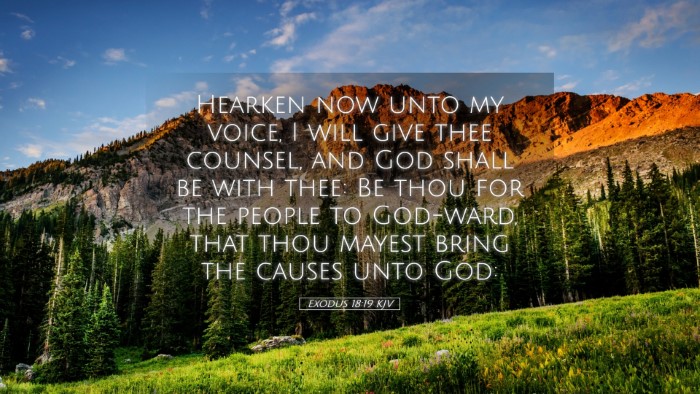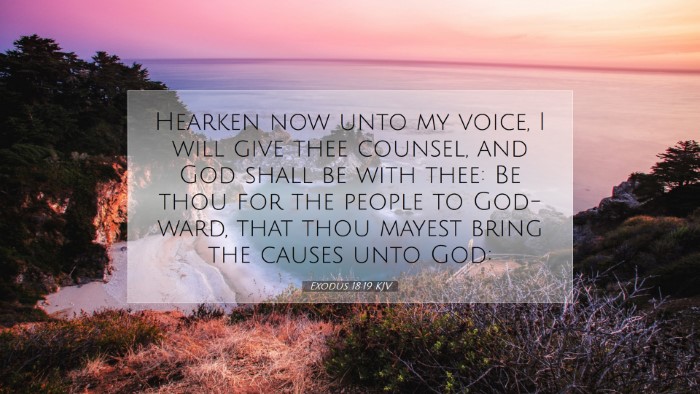Exodus 18:19 Commentary
Verse: "Hearken now unto my voice, I will give thee counsel, and God shall be with thee: Be thou for the people to God-ward, that thou mayest bring the causes unto God."
Introduction
This verse captures a pivotal moment in the narrative of Exodus, where Jethro, Moses' father-in-law, offers him sage advice regarding the governance of the people of Israel. The verse is rich with theological implications and practical wisdom, making it a vital study for pastors, students, and theologians.
Contextual Background
The context of this verse is crucial for understanding its significance. Following the Israelite exodus from Egypt, Moses finds himself overwhelmed by the demands of leading a large and diverse population. Jethro's counsel emerges from this scenario, suggesting a reformation in leadership that reflects the divine structure of governance.
Commentary Insights
Matthew Henry's Insights
Matthew Henry highlights that Jethro's advice is centered on facilitating Moses' responsibilities. He emphasizes that the role of a leader is not only to govern but to serve as an intermediary between God and the people. Henry points out:
- God's Presence: "God shall be with thee" indicates that divine support is integral for effective leadership. Leaders must rely on God's wisdom to guide their actions.
- Bringing Causes to God: The necessity for Moses to present the people's issues before God establishes the importance of prayer in leadership.
Albert Barnes' Observations
Albert Barnes focuses on the practical implications of Jethro's instruction. He observes the following:
- Shared Leadership: Barnes argues that the delegation of authority is a significant theme in this verse. It advocates for a system where responsibilities are distributed to prevent burnout and inadequacy in leadership.
- Spiritual Duties: He suggests that Jethro underscores the spiritual responsibilities of leaders, which include not only decision-making but also mediating between God and the people.
Adam Clarke's Commentary
Adam Clarke provides an exegetical analysis of the Hebrew text, offering deeper insights into the mechanics of the verse.
- Hearing and Counsel: Clarke emphasizes the significance of listening and the need for wisdom in providing counsel. The call to "hearken" indicates the vital role of attention and discernment in both receiving and giving counsel.
- Leadership Structure: He posits that the establishment of a tiered leadership structure is essential for effective administration, reflecting a divinely ordained order that leaders should emulate.
Theological Reflections
Exodus 18:19 also raises profound theological reflections relevant to modern ministry. It compels leaders to recognize that their responsibilities must be balanced with their relationship with God.
- Divine Partnership: The involvement of God in leadership decisions suggests that leaders must maintain a partnership with the divine, seeking God's guidance in every aspect of their work.
- Community Care: Being "for the people to God-ward" reminds leaders of their duty to advocate for their communities spiritually. This principle is foundational for pastoral care.
Practical Applications
The insights from Exodus 18:19 offer several practical applications:
- Develop Leadership Teams: Encourage the establishment of leadership teams that allow for shared governance to enhance decision-making processes.
- Emphasize Prayer: Integrate prayer into leadership meetings to seek God's direction actively and intentionally.
- Encourage Listening: Promote a culture of active listening within the church where counsel is sought and offered with care and wisdom.
Conclusion
Exodus 18:19 is a foundational text that provides guidance for leaders in every generation. The call to seek counsel, involve God, and serve the people presents a model for effective and godly leadership. By adhering to these principles, leaders can position themselves to fulfill their divine mandate in a way that honors God's purpose and meets the needs of their communities.


